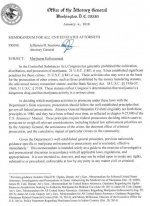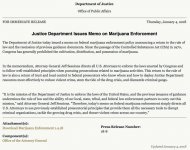https://kdvr.com/2018/01/04/u-s-to-end-policy-that-let-legal-marijuana-flourish/
stay safe everyone the cole memo is about to implode. Its looking like a state law vs feds law showdown your state wont protect you if your breaking state law. Stay up everyone this might be a good thing emphasis on might. Did these fucking lawmakers not realize what the cole memo was until now? I see this as a good thing actually so we can tell people that the feds are crazy and our reps ignore us at the fed level to change weed laws
That is the difference in a memo given out to DOJ employees and an existing federal law. No lawmakers give a shit about a memo.
Keep telling the feds they are crazy, Im sure that will change the representatives minds. Fucking amazing...




